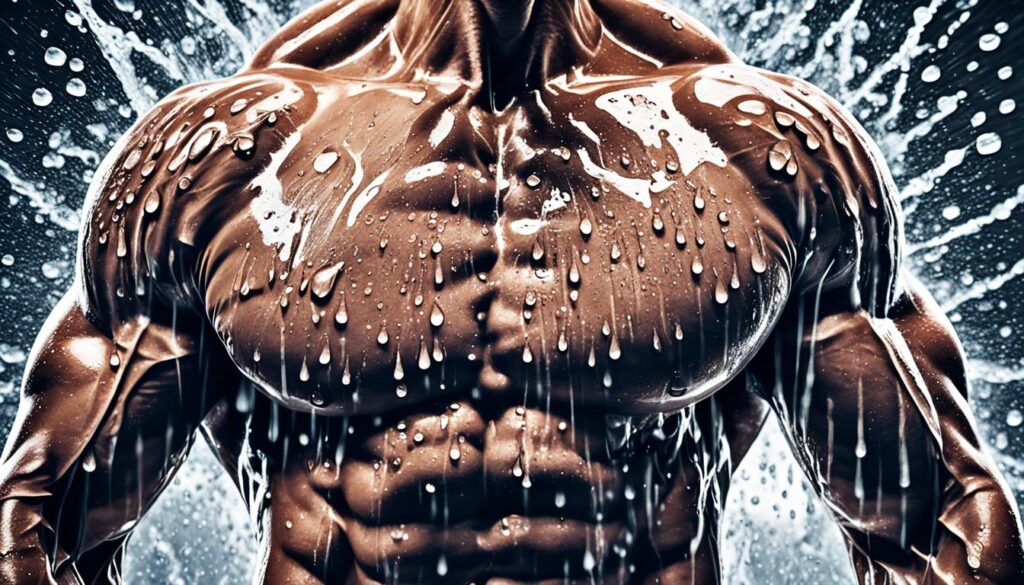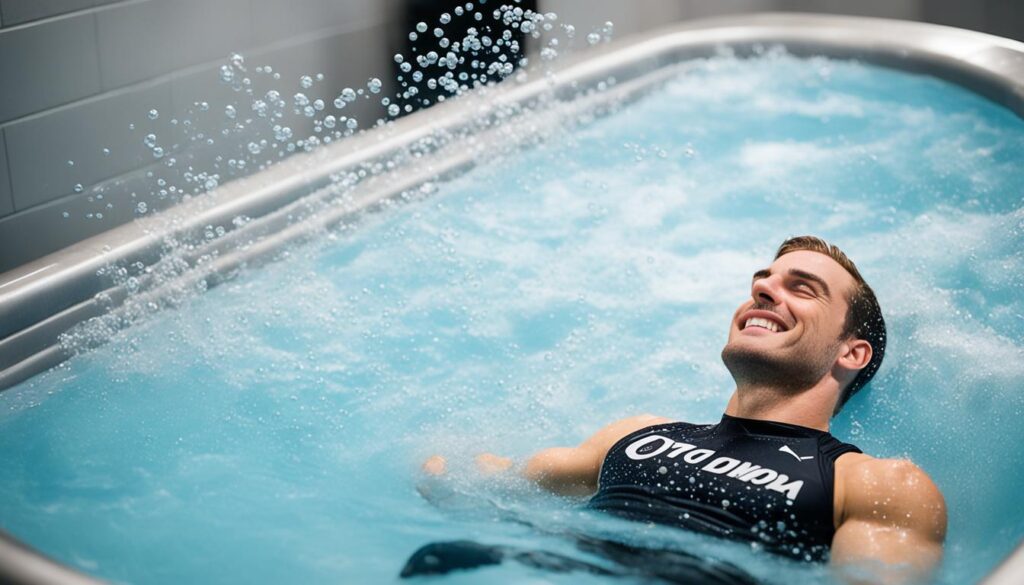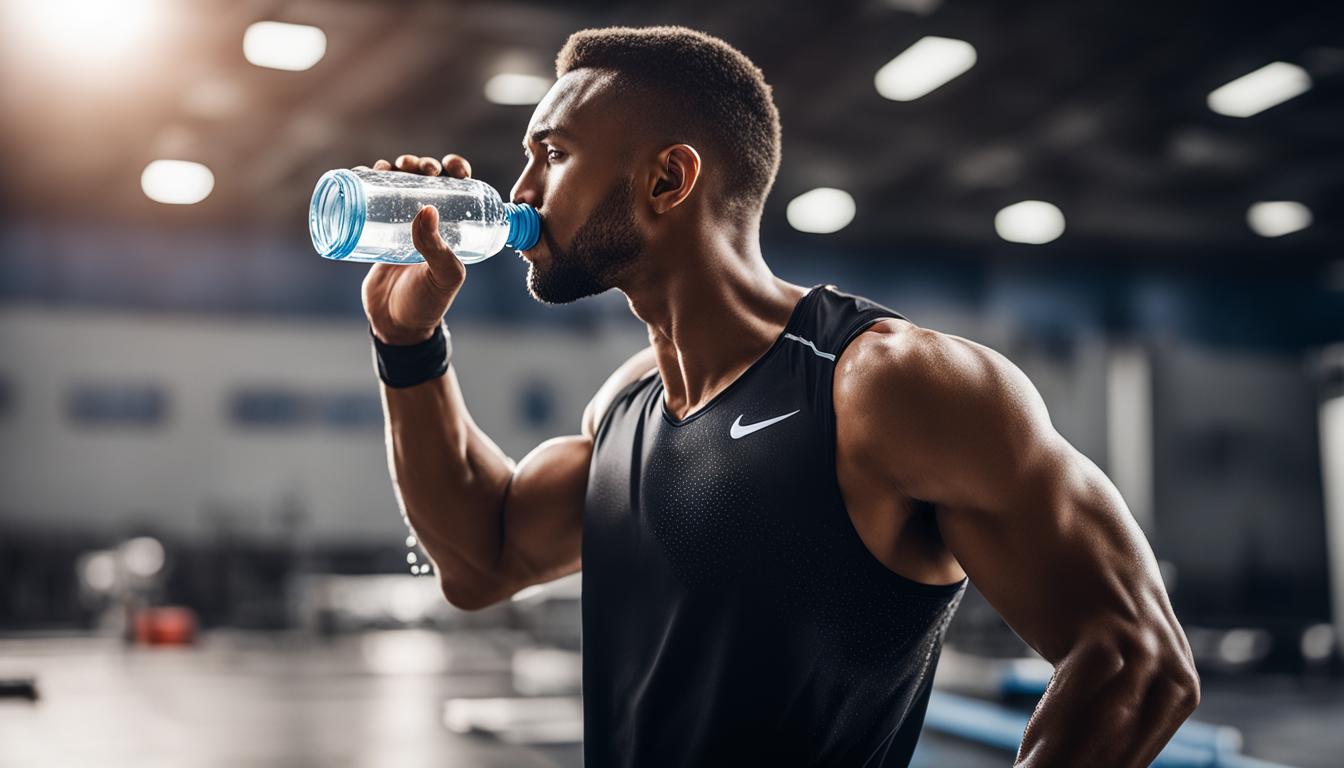Every athlete knows the burn of exertion and the subsequent quest for recovery. Central to this quest is the role of water—indispensable, yet often underestimated. Its presence in an athlete’s regimen is a deciding factor for enduring success. Understanding the importance of water for athletic performance is crucial. Water is not just a thirst-quencher; it is a vital contributor to muscle recovery and water intake regimes that are intricately designed for the high demands of an athlete’s body.
Indeed, staying hydrated for better performance is not a mere suggestion but a scientifically backed strategy. When muscles cry out during a sprint or after lifting weights, it is adequate hydration that responds to the call, facilitating faster recovery and readiness for the next challenge. As athletes push the limits of human endurance, their reliance on water’s restorative properties becomes paramount.
Key Takeaways
- Water plays a critical role in not only sustaining athletic performance but also ensuring efficient muscle recovery.
- Adequate hydration is necessary for joint lubrication, reduced risk of injuries, and maintenance of optimal muscle function.
- The importance of timely water intake cannot be overstressed—hydration needs to occur before, during, and after physical activity.
- Understanding individual hydration needs and incorporating water intake into a customized training plan is crucial for peak performance.
- Athletes should be aware of the risks of dehydration, which can severely impact both physical abilities and cognitive functions.
The Essential Link Between Hydration and Athletic Performance
For athletes striving to reach their maximum potential, maintaining proper hydration is not just about quenching thirst—it’s about ensuring that every muscle in their body operates at its peak. The benefits of hydration for muscles cannot be overstated, with water acting as a vital element for muscle health and recovery. The impact of water on muscle recovery highlights the importance of keeping the body’s fluid levels balanced, especially during intense physical exertion. Let’s explore the multifaceted role of hydration in an athlete’s life.
Preventing Dehydration: Key to Peak Physical Capacity
Dehydration can be an athlete’s silent adversary, often unnoticed until it undermines performance and wellbeing. Even a minimal loss of 2% of body fluids can significantly impair an athlete’s strength, power, and endurance—affecting the crucial seconds that differentiate victory from defeat. To circumvent these effects, athletes are encouraged to recognize the hydration for muscle health as a ritual as significant as their training routines.
Hydration and Injury Prevention: Connecting the Dots
Apart from fueling performance, hydration serves as a safeguard against injuries. By sustaining muscle elasticity and joint lubrication, water helps reduce the occurrence of musculoskeletal injuries that can sideline athletes. The relationship between hydration and muscle health is intricate and essential, given that proper fluid intake lessens the burden on the cardiovascular system, which in turn supports the entire musculature framework.
Hydration Education for Competitive Athletes
To harness the full benefits of hydration for muscles, athletes must be well-versed in the science behind it. Knowledge, attitude, and behavior towards hydration significantly influence one’s ability to stay effectively hydrated. It’s not just about drinking water; it’s about knowing when, how much, and what quality of water to drink to optimize fluid replacement—both for enhancing performance and accelerating muscle recovery. The battle against dehydration begins with education and a strategic approach to water intake tailored to each athlete’s unique needs.
As hydration is a variable concept, influenced by individual differences and environmental conditions, let’s take a closer look at the general guidelines suggested by health practitioners:
| Activity | Pre-Activity Hydration (2-3 hours before) | During Activity Hydration (Every 10-20 minutes) | Post-Activity Hydration |
|---|---|---|---|
| Training/Competition | 500-600 ml of water or sports drink | 200-300 ml of fluid | Correct any fluid loss |
| High-Intensity Workout | Elevated water intake based on sweat rate | Maintain hydration at | Replenish with water and electrolyte-rich drinks |
| Endurance Events | Varies with sweat rate & climate | Adjust intake to limit dehydration effects | Restore complete fluid balance |
In conclusion, hydration is undeniably intrinsic to an athlete’s performance regimen. Its mastery lies in its science and the proactive behaviors surrounding its implementation. From water intake to the monitoring of hydration levels, each sip is a strategic move towards achieving athletic excellence. Understanding and respecting the power of water is non-negotiable for those aiming to maintain optimal muscle health and recovery, and secure their place at the pinnacle of their athletic pursuits.
Understanding Hydration: Challenges and Misconceptions Among Athletes
The quest for peak athletic performance has long sought the holy grail of optimized hydration. Yet, even as the science underscores how water affects muscle performance, misconceptions continue to challenge the incorporation of hydration best practices. Acknowledging these obstacles is the first stride toward staying hydrated for better performance.
Dispelling the Thirst Myth: Knowing When to Hydrate
The pervasive belief in thirst as the primary indicator of hydration needs is a widespread misstep among competitors. In reality, thirst is an alarm bell that rings too late, as it often signifies that the body is already grappling with the effects of dehydration. This misunderstanding underscores the need for education on recognizing early signs that water intake is necessary to sustain muscle performance and endurance.
Recognizing and Overcoming the Barriers to Adequate Hydration
Moving beyond myths to mastery, athletes face tangible barriers in maintaining optimal hydration. The heft of gear and the swelter of exertion contribute profoundly to fluid loss, often without the athlete’s awareness. These barriers underscore the imperative for thoughtful hydration strategies—ones that are attuned to the ebbs and flows of the athlete’s hydration levels during the unforgiving rigors of their sports.
Navigating the terrain of hydration requires a balance of knowledge, reliance on proper indicators, and bespoke strategies. The challenge lies not only in understanding that one must stay hydrated but also discerning how and when to do so to leverage the full spectrum of performance benefits attributed to water.
The Role of Water in Muscle Recovery and Performance
When it comes to achieving peak athletic performance, the contribution of water and muscle recovery cannot be overlooked. From powering high-intensity workouts to facilitating post-exercise muscle regeneration, water is at the core of fitness protocols. Hydration is critically intertwined with muscle recovery, offering a myriad of benefits for muscle health. It’s not only crucial for basic bodily functions but also for sustaining the intense demands placed on an athlete’s physique.

In the realm of athletics, muscle recovery and water intake are closely interlinked. A well-hydrated body ensures optimal blood flow to muscle tissues, providing not only oxygen but also the necessary nutrients that aid in repair and growth. Meanwhile, an inadequately hydrated body may experience limited muscle blood flow, thereby stunting the recovery process and diminishing performance capabilities. As such, athletes are encouraged to drink water consistently throughout the day, not solely around workout sessions.
Consider the effects of dehydration: it impairs the body’s ability to regulate its temperature, leading to an increased likelihood of fatigue, muscle cramps, and potential injury. These disruptions can have a noticeable impact on an athlete’s training consistency and their competitive outcomes. Therefore, understanding the intricate relationship between hydration and muscle health becomes vital for any serious athlete.
Highlighting the benefits of hydration for muscles, maintaining a proper hydration status is akin to providing quality fuel for a high-performance race car. It ensures that every biological system is working efficiently and resiliently against the physiological stress caused by exercise. To underscore these points, here’s a comparative table on the effects of being hydrated versus dehydrated during workout recovery periods:
| Condition | Physiological Impact | Recovery Time | Muscle Performance |
|---|---|---|---|
| Well-hydrated | Optimal nutrient delivery and waste removal | Quickened due to efficient muscle repair | Enhanced strength and endurance |
| Dehydrated | Impaired thermoregulation and blood flow | Extended due to delayed muscle recovery | Reduced strength and power output |
Furthermore, the incorporation of water into an athlete’s diet is not a one-size-fits-all protocol. The balance between muscle recovery and water intake must be fine-tuned according to various factors such as body weight, exercise intensity, and environmental conditions. By understanding and applying personalized hydration strategies, athletes set the stage for transcendent performance and longevity in their sports careers.
- Regular water intake before, during, and after exercise enhances muscle recovery and reduces recovery time.
- Adequate hydration supports the maintenance of normal muscle function and boosts overall athletic performance.
- Dehydration can lead to several negative outcomes, including muscle weakness and a decrease in anaerobic power.
To conclude, water’s pivotal role in muscle recovery and performance is unmistakable. It is both a preventive measure against muscle fatigue and an essential component of an athlete’s recovery arsenal. Thus, athletes should treat hydration with the same precision and care as any other aspect of their training regimen, ensuring that water continues to be an ally in their journey toward athletic excellence.
Innovative Recovery Techniques: The Power of Water Immersion
In the continuous evolution of sports science, water’s impact on muscle recovery has taken center stage, with diverse water immersion techniques emerging as innovative recovery strategies for athletes. By understanding and utilizing the numinous qualities of water, athletes have discovered how staying hydrated and immersed can significantly enhance recovery and performance.
Cold Water Immersion and Its Recovery Benefits
Cold Water Immersion (CWI) is more than just an invigorating splash; it’s a ritual for resilience and recuperation. Typically involving temperatures ranging from 10 to 15°C for periods of 5 to 15 minutes, CWI is celebrated for its ability to reduce muscle soreness after intense periods of training. The chilling embrace of the water eases inflammation, making it a reliable ally in the athlete’s recovery process.
Contrast Water Therapy: Alternating Temperatures for Maximum Recovery
Contrast Water Therapy (CWT), the dynamic play between hot and cold, offers a recovery symphony of temperature modulation. While immersed in this aquatic dance, the body’s blood vessels respond rhythmically—dilating in warmth and constricting in the cold—for periods of roughly 1 minute in each extreme. This alternating sequence, typically lasting no more than 15 minutes in total, fosters expedited recovery by stimulating circulation and aiding in the removal of lactic acid from tired muscles.
Hot Water Immersion: Analyzing the Impact on Muscle Recovery
Hot Water Immersion (HWI) presents a duality in its influence on muscle recovery. Where warmth is synonymous with comfort and relaxation, the effectiveness of HWI for athletic recovery remains a divergent subject. While it might promote blood flow and ease psychological stress, the direct effects on enhancing physical recovery post-exercise exhibit a mosaic of study outcomes, leaving a trail of intrigue for further research.
Understanding the optimal interplay of these immersion techniques within an athlete’s regime can be transformative. The drive for excellence in sports compels athletes to not only maintain hydration but to embrace water’s curative properties off the field. This intricate relationship nurtures the athlete’s body, ensuring readiness for the next hurdle and imprinting the power of water immersion within the landscape of sports recovery.

The choice among these water immersion methods is not a one-for-all. Instead, it reflects a strategic approach that takes into account the athlete’s specific circumstances and recovery needs. These methodologies, rooted in science and refined by practice, attest to the intricate ballet of staying hydrated for better performance. They serve as a testament to the timeless synergy between water and wellness, and through continual use, allow for ever-elevated levels of athletic performance enhancement.
| Recovery Technique | Temperature Range | Typical Duration | Intended Benefit |
|---|---|---|---|
| Cold Water Immersion (CWI) | 10-15°C | 5-15 minutes | Reduces inflammation and muscle soreness |
| Contrast Water Therapy (CWT) | Alternating hot/cold | Up to 15 minutes | Stimulates circulation and lactic acid removal |
| Hot Water Immersion (HWI) | ≥36°C | Varies | Promotes relaxation, comfort, and blood flow |
Hydration and Electrolyte Balance: Enhanced Performance Through Science
The importance of water for athletic performance transcends mere hydration; it’s about striking an intricate balance between hydration and electrolyte balance to ensure peak physical condition. In the heated throes of competition or during grueling practice sessions, it’s not just about drinking water but replenishing the necessary electrolytes lost through perspiration that facilitates continued muscle contraction and nerve function.
Electrolytes like salt, potassium, calcium, phosphate, and magnesium play a critical role in muscle function, nerve transmission, and nutrient absorption. The loss of these key electrolytes, particularly salt, can result in muscle cramps, reduced stamina, and a slower recovery process, hence affecting overall athletic performance and recovery.
For optimal sports performance, it’s essential not just to rehydrate but to restore the lost balance of electrolytes. Sports drinks have become a staple in an athlete’s diet, formulated with a balance of carbohydrates and electrolytes to rapidly replace what is expended during rigorous physical activity.
Implementing comprehensive hydration plans tailored to the type of activity and individual athlete requirements is critical. Let’s delve into some general recommendations for athletes to maintain hydration and electrolyte balance:
| Timeframe | Hydration Objective | Recommendation |
|---|---|---|
| Before Exercise | Start well-hydrated | 500-600 ml of water or a sports drink containing electrolytes |
| During Exercise | Replace lost fluids | 200-300 ml every 10 to 20 minutes, adjusted for conditions and intensity |
| After Exercise | Recover fluid and electrolyte balance | Post-exercise rehydration should replace any body weight lost, ideally choosing solutions rich in electrolytes |
These guidelines underscore just how athletes must be vigilant about their water and electrolyte consumption at every stage of their physical activity. Monitoring consumption not just during but before and after training or competitions is vital to maintaining the necessary balance for muscle performance and recovery.
As the science of sports nutrition evolves, it becomes increasingly clear that the hydration and electrolyte balance is a sophisticated dance that needs to be personalized according to the athlete’s body composition, environmental conditions, and the specifics of the sport.
In sum, water isn’t just a medium for quenching thirst—it’s a critical component for winning performances. Combining water with the right proportion of electrolytes, athletes can harness the full power of hydration for better performance, ensuring that every step, jump, and throw is as potent as the last.
Conclusion
In the rigorous world of athletics, the role of water in muscle recovery and performance is as pivotal as any training routine. With the plethora of evidence supporting the benefits of hydration for muscles, the link between water and muscle recovery can no longer be seen as a mere suggestion but a fundamental aspect of an athlete’s journey. As athletes relentlessly pursue excellence, staying hydrated for better performance emerges as a crucial determinant of victory and vitality. This commitment to hydration transcends the act of drinking water; it embodies a comprehensive approach to electrolyte balance, customized hydration strategies, and the embracing of innovative recovery techniques.
The knowledge that proper hydration and attention to electrolyte balance are cornerstones for sustaining health and optimizing muscle recovery now sets the foundation for performance strategies. Athletes who are well-informed about their individual hydration needs can actively prevent injuries, ensure optimal physical function, and maintain mental sharpness—affecting both their mood and concentration. Whether by employing water immersion as a recovery tactic or by recognizing barriers to effective fluid intake, athletes enhance their prowess and endurance on the competitive field.
As research continues to deepen our understanding of hydration science, the need for tailored hydration strategies becomes evident, taking into account the athlete’s body, the exercise environment, and the demands of specific sports. For athletes looking to achieve and maintain peak performance levels, the importance of integrating adequate water and electrolyte intake into their daily routine is undeniable. Ultimately, the pursuit of athletic superiority is inextricably linked to how well athletes hydrate and recover—the two driving forces behind an exceptional display of physical prowess and resilience.




